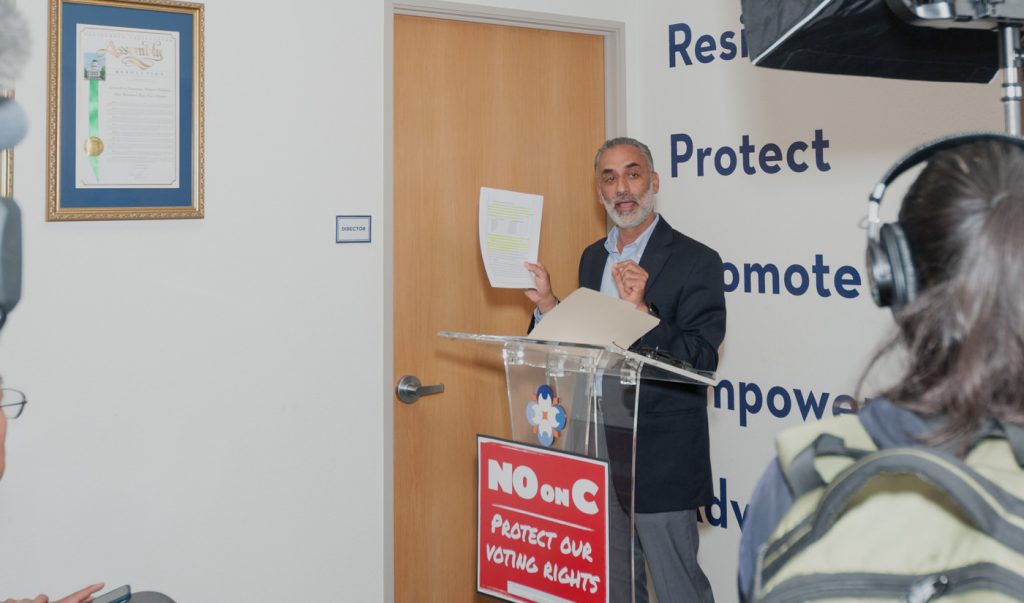Santa Clara’s attempt to undo the City’s six court-ordered Council election districts by merging them into three districts, each with two at-large seats — Measure C — is getting state-level attention. And not in a positive way.
Thursday afternoon, California Secretary of State Alex Padilla took time from a visit to the South Bay promoting California’s new Voters Choice system to speak at a press conference held by opponents of Santa Clara’s Measure C at the Council on American-Islamic Relations’ (CAIR) Santa Clara office.
It’s a matter of interest to the state’s highest elections authority, Padilla told The Weekly, because it is a “blatant case of cynicism” about the court ruling. “It couldn’t be more blatant.”
In addition to Padilla and CAIR, the roster of Measure C opponents at the press conference included civil rights groups the Asian Law Alliance, La Raza Roundtable and the NAACP; Santa Clara Council Member Raj Chahal; former State Assemblyman Paul Fong; and plaintiff in the voting rights lawsuit that Santa Clara lost in 2018, Wesley Mukoyama.
Opponents were unsparing in their critique of Measure C, casting it as a move to suppress minority voters and views by “diluting” them in a larger voting population, as well as a waste of taxpayer money.
“All across the country I see a strategic attack on voting rights,” Padilla told the group. “Time and time again throughout our history as a nation there has been election policy and political structures that have been used to restrict the ability of voters of color to elect representatives of their choice. Similar policies have been struck down in the courts time and time again.
“Shockingly,” he continued, “Measure C — here in the state of California in 2020 — threatens to dilute the voting power of minorities’ to elect representatives of their choice at the local level. Measure C does not measure up to the democratic ideals we hold near and dear. Now, more than ever we have a responsibility to support democratic institutions.”
“Measure C stands in the way of more inclusive democracy,” said CAIR Coordinator of Government Affairs and Santa Clara resident Sameena Usman.
“The City of Santa Clara has only elected one person of color and that person was only elected after the new system was put in place,” she continued. “Obviously there was something wrong. Why is Santa Clara risking millions of taxpayer dollars to fight this? Why are some leaders trying to dilute minority representation and have used public funds to spread misinformation?”
“There was never a person on the [Santa Clara] Council representing the 41 percent of residents who are Asian,” said Wesley Mukoyama, a 46-year-old resident of the City and a plaintiff in the 2018 voting rights lawsuit.
“In 2011 we told the City it was in violation [of the California Voting Rights Act],” he said, “and they waited until 2017 when a group of us took it to court. In 2018, Judge Kuhnle ordered the City to adopt six districts. We thought we won, but first they tried to pass two districts. We won that fight — with only $7,800 against $90,000. Now they’re back with Measure C.”
Several speakers referred to a recent City Hall mailer — “Impartial Analysis by the City Attorney [Brian Doyle*]” — as “misuse of public funds” to promote Measure C and “misinformation.”
Pointing to the judge’s ruling, Santa Clara Council Member Raj Chahal noted that the ruling prohibited the City from conducting any at-large elections and explicitly changed the charter — contrary to Doyle’s claim that a ‘No’ vote will restore at-large by-seat elections.
No ballot measure is necessary for the City to adopt six districts, Chahal said. California law (Gov’t Code 34886) provides a mechanism to adopt the charter change and other charter cities — for example, Palm Springs — have used it.
Chahal also noted that despite the fact that 66 percent of those surveyed on the question favored six districts, the City is ignoring its own survey and claiming that the three-district scheme is the result of public input.
“We are already on the hook for $3 million and $800,000 for the City’s lawyer,” said Chahal. “I want to protect taxpayer dollars. They should be spent for residents, not on a lawsuit we’ve already lost.” As the City is appealing the verdict and the award, the legal meters continue to run.
Former State Assemblyman Paul Fong noted that even Measure C’s proponents don’t argue for the district-merger scheme.
Instead of trying to convince voters to support the measure, Fong said, “The leaders of Santa Clara have tried to make this about the 49ers. We asked for the 49ers’ help and we are grateful that the 49ers joined the right side.
“The question isn’t, ‘why do the 49ers care,’” he said. “The question is, ‘why is the City opposing six districts?'”
*On social media Doyle has publically advocated for Measure C and called opponents “naïve.” He has repeatedly stated his view that the CVRA doesn’t apply to charter cities, expressed his opinion that Santa Clara can win a CVRA lawsuit, and been the face of the City’s opposition to the court order.
